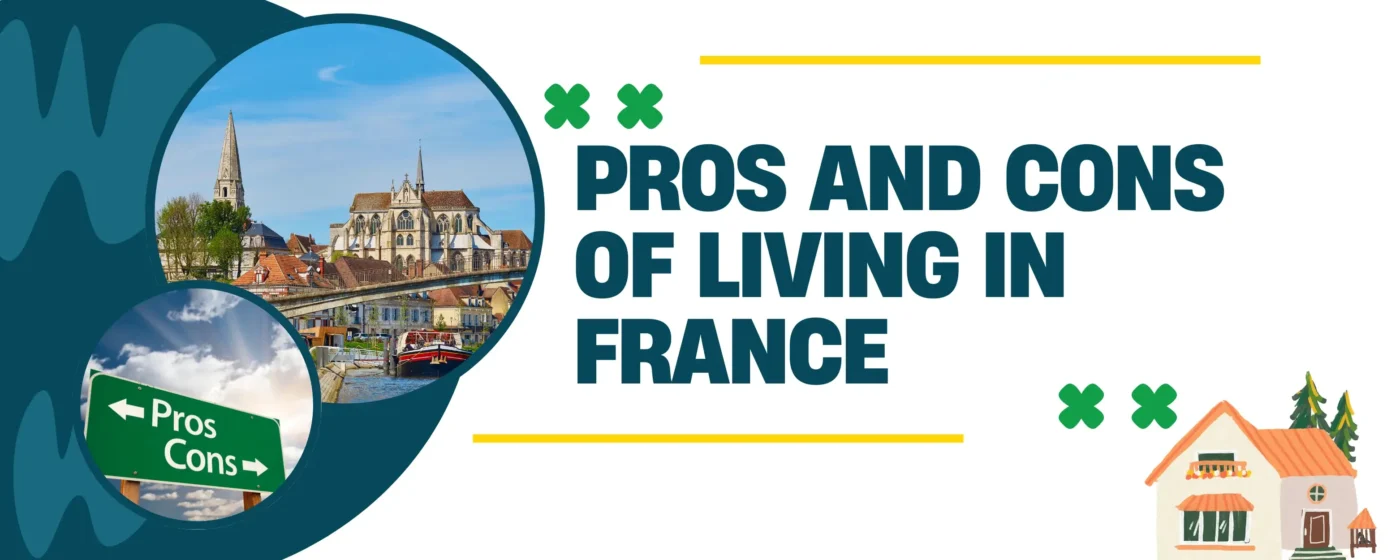Thinking of moving to France? You’re not alone. From world-class food to scenic countryside, France is a dream for many expats. But daily life here isn’t always rosé and croissants, there are real challenges too. Imagine enjoying long lunches, beautiful art, and vibrant cities! However, moving to France also comes with its own set of challenges, like navigating bureaucracy or adjusting to the language. While life there offers many advantages, be prepared for some hurdles too.
Key Takeaways
- France boasts beautiful lands, a rich culture, world-class cuisine, an efficient public transport system, etc.
- There are major drawbacks, including slow, complex bureaucracy, high living costs in cities, and language barriers for newcomers.
- France takes care of healthcare and a high quality of life with long vacations and a relaxed work culture.
- There are cities such as Paris, where is high cost of living and expensive housing can pose financial challenges.
- Expats appreciate the strong social security system and the emphasis on family and social welfare, despite taxation and housing issues.
Find a short list of pros and cons below:–
| Pros | Cons |
|---|---|
| Excellent healthcare | Bureaucracy is slow and complex |
| Great food and wine | High cost of living in big cities |
| Beautiful countryside | Language barrier for newcomers |
| Strong expat support | Limited shopping hours |
| Affordable education | Frequent strikes |
Next in this guide, we’ll break down the 8 major pros and 7 real-life cons of living in France, so you can decide if this lifestyle is right for you.
8 Pros of Living in France
Exceptional Healthcare System
France boasts one of the world’s top healthcare systems! Residents here enjoy excellent quality care: from cutting-edge hospitals to dedicated top-notch doctors. Doctor visits are easy to schedule and very affordable, thanks to a robust social security system that covers a large portion of costs. This fantastic combination ensures the French population stays healthy without sweating and running through their savings in case of an emergency.
French Culture and Community
Living in France means immersing yourself in a rich tapestry of art, history, and tradition. French culture is celebrated year-round through vibrant festivals, world-class museums, and lively street events, especially in major cities like Paris, Lyon, and Marseille.
The French government is deeply committed to preserving its cultural heritage, ensuring that both traditional and modern lifestyles thrive side by side. Whether you’re admiring the scenic beauty of the French Riviera or exploring iconic landmarks like the Eiffel Tower, you’ll find that France ranks among the world’s most culturally rich countries.
World-Class Cuisine and Wine
France’s reputation for gastronomy and wine is legendary. France’s position in world-class cuisine and wine cannot be ignored. Food and wine are at the heart of French culture, not just for sustenance but as a way of life. Every region has its own unique specialties, from delicate crêpes in Brittany to the ever-famous ratatouille in Provence. World-famous culinary traditions like fine dining, pastry-making techniques, and diverse cheeses are deeply ingrained in the French way of living.
High Quality of Life
France is known for prioritising life outside of work—long lunches, generous paid leave, and an emphasis on quality downtime. Life in France moves at a relaxed pace, providing an excellent work-life balance. Long vacations are common, emphasizing the importance of leisure alongside work. Employees benefit from a generous number of paid holidays, which supports a healthy work-life balance and overall well-being.
French culture encourages taking time to enjoy the simpler things in life, like a leisurely meal, good wine, or simply savoring moments with loved ones. Life in France is about living well and appreciating life’s simple pleasures, instead of just existing.
Beautiful Countryside and Diverse Landscapes
Heard people raving about those French Alps views? Well, France truly has it all! The French Riviera has glamorous beaches, Provence has its charming lavender fields, ancient villages, and delicious food. For mountain lovers, the majestic French Alps offer stunning peaks, skiing, and hiking.
Whether you seek sunny coasts, picturesque countryside, or exhilarating snowy landscapes, France offers a perfect picturesque escape for every taste. The beautiful landscapes found throughout France are a major draw for both locals and expat.
Public Transportation and Accessibility
Ever seen a French person crib about their public transportation system? Well that’s because France’s TGV (high-speed trains) make traveling incredibly easy by connecting major cities across France, like Paris, Lyon, and Marseille at super-high speeds. This network also extends into Europe, linking cities in Belgium, Germany, Spain, and Italy.
Complementing the TGV, extensive public transit systems within cities – metros, buses, and trams – ensure seamless local travel. This integrated network allows for quick, efficient, and comfortable journeys throughout France and beyond.
Affordable Education
Another major benefit is affordable education. The French system offers high standards and structure, with low tuition fees for higher education thanks to government subsidies. This makes studying in France accessible for many, and is a significant advantage for expats and families considering a move.
Expat Communities and Support
Moving to a new country can be daunting, but France’s strong expat community makes the transition much smoother. Major cities like Paris and Lyon are home to vibrant expat communities, where newcomers can connect with fellow expats and find practical advice for navigating French bureaucracy, opening a bank account, or understanding the tax system. Speaking French is a huge benefit for integrating into French society, but you’ll find plenty of support and resources to help you along the way.
Plan your next trip with our list of historical sites in France to visit in 2025 and explore timeless landmarks.
Experience France, Learn the Language!
Discover hidden gems with our language and culture insights. Explore with us!
7 Cons of Living in France
Every coin has 2 sides to it. Similarly, while France offers a variety of advantages, here are some cons of living in France:
Bureaucratic Challenges
From getting a visa to managing taxes, bureaucracy is an unavoidable part of life. Navigating French paperwork can be a tricky task, involving many steps and documents. For example, setting up a bank account often requires a long list of proofs: passport, visa, address, and sometimes even a utility bill.
Registering for services like electricity or the internet follows similar detailed procedures, demanding patience and lots of precision! The French tax system is also complex, with residents needing to understand obligations like the annual French residence tax (taxe d’habitation) and housing tax, which can add to the administrative burden.
High Cost of Living in Major Cities
Living in the major French cities, like Paris, Lyon, Marseille, can prove to be super expensive! Housing is the biggest cost, with rents for even small apartments being very high. For example, the average rent for a one bedroom apartment in large cities can be a significant portion of your budget, and city living overall comes with higher living costs compared to rural areas.
Groceries, transportation, and eating out also add up quickly to this bill. In addition, high taxes—including income tax, social security tax, housing tax, and the annual French residence tax, further impact residents’ finances. This high cost of living means that while city life offers many opportunities, it can be a significant financial challenge for residents.
Language Barrier for Non-French Speakers
Think France is the best place to learn the language? Think again. Not knowing even basic French in France can make simple daily tasks seem daunting. Ordering food, asking for directions, or even understanding signs can become a challenge. You might also miss out on local experiences and feel disconnected.
Adapting to the social norms of a foreign country can be difficult, as unwritten rules and cultural expectations may differ greatly from what you’re used to. Therefore, it’s crucial to invest time in learning basic French before moving to the country, making interactions smoother and your stay much more enjoyable.
Strict Work Culture and Limited Flexibility
Think the French work culture is all fun and no work? You’re wrong! Integrating into the French work environment can be challenging. It often involves navigating a different professional culture, which is extremely hierarchical and often formal than some other countries. Fluent French is incredibly important to work here: for daily communication, understanding nuances, and building relationships with colleagues.
Without a good grasp of the language, opportunities for career advancement and fully integrating into the team can be limited, making it harder to thrive. Most holidays for families and school breaks occur during the same period, especially in mid-July, which can affect travel plans and availability.
Weather Variability
France’s weather can be quite unpredictable! Summers in the south are often very hot, and winters in the north are usually super-cold with snow and chilly winds. Even within a particular region, conditions can change quickly. So, whether you’re heading to the sunny Mediterranean or the cooler coast, act wisely and pack for the myriad of weather possibilities.
Limited Shopping Hours
In France, stores often have limited opening hours, especially outside big cities. You’ll find that shops usually close during lunch for a few hours. Not only that, Sundays are typically restricted, with most small shops and even supermarkets being closed all day! This reflects a different cultural approach to work-life balance than you might be used to and causes some distress when first starting to live in France.
Strikes and Protests
Notice how France is often in the news for protests that keep happening? Well, such strikes and protests are kind of a part-and-parcel of French life. They are quite common in France, often used by workers as a way to demand better conditions or raise their voices against some injustice. These things can significantly disrupt daily life: public transport often stops running in such situations, schools also end up closing till things calm down.
To understand its deep cultural roots, read this detailed post on the French Flag: History, Symbolism, and Significance.
Frequently Asked Questions
1. Is wine a good gift to bring for the host when invited somewhere?
Ans: Not really. Bringing your host some wine can sometimes be seen as implying you don’t trust your host’s selection of wine! It’s often safer to bring high-quality chocolates, a thoughtful book, or flowers!
2. Is it true that French people don’t use much ice in their drinks?
Ans: Yes, generally! The French prefer their drinks, including water and soft drinks, at room temperature or only lightly chilled. If you want a lot of ice, you’ll almost always have to specifically ask for “des glaçons”.





